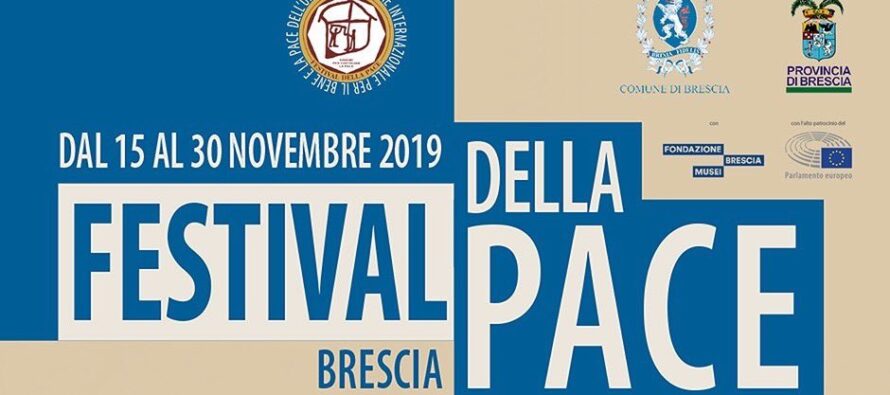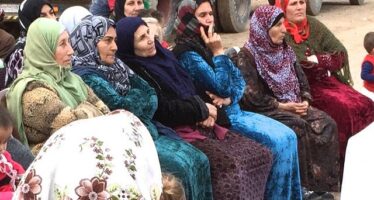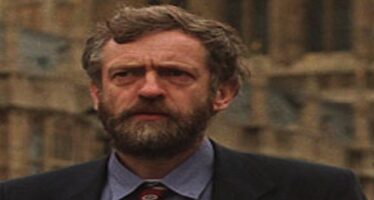Kurdish artist Zehra Doğan to hold exhibition in Brescia

![]()
Brescia (Italy) will host the third Edition of the Festival of Peace from Friday 15 to Saturday 30 November.
The festival will host important names who, at international level, have been exposed for defending human rights and harmony among peoples. This year marks the thirty years since the fall of the Berlin Wall, an epochal event in contemporary European and world history.
This is why the organisers wanted the new edition of the Festival to become an opportunity to develop a reflection on Europe and today’s world.
The festival enjoys the high patronage of the European Parliament and the President of the European Parliament David Maria Sassoli will join the inauguration on Friday 15 November.
The central theme of the event will be a reflection on today’s Europe and on the “new walls”, tangible and intangible, which threaten peaceful coexistence and relations between human beings.
The program offers events, shows, meetings and exhibitions. Kurdish artist and journalist Zehra Doğan will be exhibiting her work. “We will have better days too” is the name of the exhibition by Zehra Doğan which will be inaugurated on Friday 15. The Kurdish artist was imprisoned for 33 months by the Turkish regime, and will meet the audience on 23 November.
The 20 of November will focus on the theme of femicide. While another important event will be the presentation of Behrouz Boochani’s book “No friend but the mountains” on 28 November. Iranian Kurdish journalist Boochani will be talking with the audience via Skype from the island of Manus, Australia, where he has been detained for five years.
Related Articles
My experience with Communes and Committees in Rojava
![]()
My Rojava experience began with six months in the YPG during the campaign to liberate Raqqa from Daesh
AFGHANISTAN, UNA GUERRA CHE NON SI PUO’ VINCERE – Tariq Ali
![]()
The Guardian. Non è nessun segreto su cosa sta facendo Pakistan con i talebani. Tutte le parti in conflitto sanno
KURDISTAN SENZA TREGUA
![]()
 Torna sulle prime pagine dei giornali il conflitto kurdo-turco. I 26 (o 24 a seconda delle fonti) militari turchi morti in una serie di attacchi simultanei sferrati dai guerriglieri del PKK contro diversi obiettivi delle forze di sicurezza nella zona di Hakkari hanno fatto gridare a una nuova recrudescenza del conflitto. In realtà la guerra non è mai cessata, le operazioni dell’esercito turco non sono mai diminuite. Anzi, da agosto si susseguono bombardamenti in tutta la zona al confine con Iraq e Iran e spesso e volentieri gli F-16 turchi sono entrati nel Kurdistan iracheno colpendo non tanto o non solo le basi del PKK (il Partito dei Lavoratori del Kurdistan) ma soprattutto villaggi facendo molte vittime civili di cui nessuno parla.
Torna sulle prime pagine dei giornali il conflitto kurdo-turco. I 26 (o 24 a seconda delle fonti) militari turchi morti in una serie di attacchi simultanei sferrati dai guerriglieri del PKK contro diversi obiettivi delle forze di sicurezza nella zona di Hakkari hanno fatto gridare a una nuova recrudescenza del conflitto. In realtà la guerra non è mai cessata, le operazioni dell’esercito turco non sono mai diminuite. Anzi, da agosto si susseguono bombardamenti in tutta la zona al confine con Iraq e Iran e spesso e volentieri gli F-16 turchi sono entrati nel Kurdistan iracheno colpendo non tanto o non solo le basi del PKK (il Partito dei Lavoratori del Kurdistan) ma soprattutto villaggi facendo molte vittime civili di cui nessuno parla.
Gli attacchi di ieri hanno suscitato reazioni molto forti, comprensibilmente. A parte il presidente della repubblica, l’islamico Abdullah Gul, che ha promesso “vendetta” e altro sangue, è stato il BDP (Partito della Pace e Democrazia), cioè il partito dei kurdi a fare la prima dichiarazione. “Basta – si legge nel comunicato – con la guerra. E’ tempo che le armi tacciano e si realizzino le condizioni per favorire la pace”. Parole che il BDP va ripetendo da anni ormai. In questo sostenuto dal PKK che (è bene ricordarlo) ha osservato un cessate il fuoco unilaterale fino al 15 giugno di quest’anno. Cioè fino a dopo le elezioni politiche che hanno visto kurdi e sinistra turca eleggere ben 36 deputati al parlamento turco. Quello che è successo dopo questo risultato serve a contestualizzare anche l’attacco di ieri, al quale i turchi hanno risposto con una nuova offensiva aerea in nord Iraq.
Uno dei 36 deputati, Hatip Dicle (in carcere), è stato privato del suo mandato per un ‘reato’ (lui che era già stato deputato con Leyla Zana e aveva già fatto 10 anni di carcere) di natura ‘terroristica’. Cinque deputati sono attualmente in carcere. Al giuramento, dopo un boicottaggio durato tre mesi e mezzo, si sono presentati in 30. Da marzo a oggi sono finiti in carcere qualcosa come ottomila tra amministratori locali kurdi, attivisti per i diritti umani, militanti del BDP con l’accusa di essere in qualche modo legati al PKK. Dal 2009 (anno della vittoria dei kurdi alle amministrative) sono sotto processo oltre quattromila politici kurdi. Dal 27 luglio il presidente del PKK Abdullah Ocalan (in carcere dal 1999 sull’isola di Imrali) non può vedere i suoi avvocati. Un divieto imposto dopo che per mesi uomini del premier Recep Tayyip Erdogan hanno incontrato il leader kurdo per concordare “protocolli di pace” poi gettati nel cassetto.



